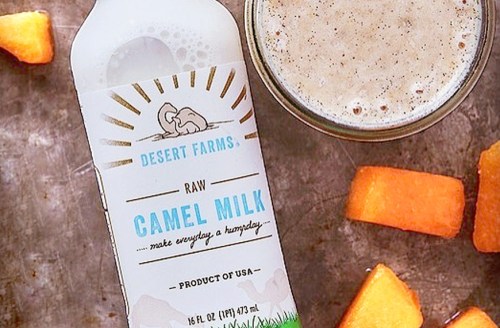Our editors independently select these products. Making a purchase through our links may earn Well+Good a commission
Calling it: You’re about to see a lot more camel milk on store shelves
Here's everything you need to know about camel milk benefits, including how it compares to cow's milk nutritionally, what it tastes like, and how to get the new trendy milk, which has long been popular in the Middle East and Africa.

Since your childhood, the milk aisle at the grocery store has undergone a hefty makeover that’s led to offerings way beyond the standard skim, 1 percent, 2 percent, and whole options. (And soy, if your parents were particularly progressive.) Between almond, coconut, oat, pecan, rice, hemp, and even pea (seriously, what can’t you milk?), there’s now a lot to choose from—and blessedly so for people trying to live their best dairy-free life. The latest trending option is the most adventurous one yet—and no, it’s not the cockroach-derived variety of your nightmares. Rather, camel milk is now a totally real, totally healthy, and totally exotic thing that’s—yep—totally growing in popularity.
Already big in the Middle East and Africa, camel milk is more nutrient-dense than cow’s milk, containing 10 times the amount of iron and five times the amount of vitamin C, The Washington Post reports. Perhaps this, along with it not containing the whey proteins that can trigger allergies, is why demand is surging in the U.S.
Obviously, camels aren’t exactly as abundant here in the States as they are in Dubai, so keeping your fridge stocked with a gallon of the stuff—which people reportedly say tastes like a slightly salty cow’s milk—can be pretty pricey. Desert Farms, a purveyor working with a handful of camel farms in the U.S., sells the elixir for roughly $10 for an 8 ounce bottle. For a deal, buy freeze-dried camel milk powder on Amazon for $3 per serving.
Still, with limited quantities and high prices for the health-boosting elixir in the U.S., just milk it as another reason to add Africa and the Middle East to your travel bucket list. Especially since one Well+Good editor, who recently traveled to Dubai, says she sipped some particularly delicious chocolate camel milk during her trip. Yum.
With so many alt-milks out there, it’s tricky to know which one is best. Here’s a rundown of the nutritional pros and cons for each. If you want to cut out dairy completely, here’s how.








